
January 15, 2015
“I basically trade flowers for food,” says Meredith Skene, owner of Stems by Meredith, a floral arrangement company that caters primarily to high-profile restaurants in Philly.
That’s a typical understatement from Skene, who started her florist business almost by accident.
Skene found her way to flora by way of food. From her start ordering flowers as a hostess at Vetri, the original restaurant of the ever-expanding Italian food empire, she discovered her life’s passion – and a viable business selling joy of her own.
Like many before her, Skene fell into the food service industry when life bottomed out. An aspiring teacher, she was a senior studying elementary education at Temple University when she got sick. She moved back home with her parents and was hospitalized. A diagnosis of Crohn’s disease, a painful chronic inflammatory condition affecting the digestive tract, and surgery followed. After missing two semesters of school, she dropped out.
Skene looked to restaurants for work. At the time, Bill McKinley was a manager at Vetri, the eponymous flagship of the Philly-based chef/owner, and a regular lunch customer at Matyson, where Skene worked.
“By some miracle,” she says, she landed a job as a hostess there.
In 2013, Stems by Meredith got its business license with a little help from Skene's now-husband, an insurance executive. Its name is a play on the flowers and the woman who carts them around.
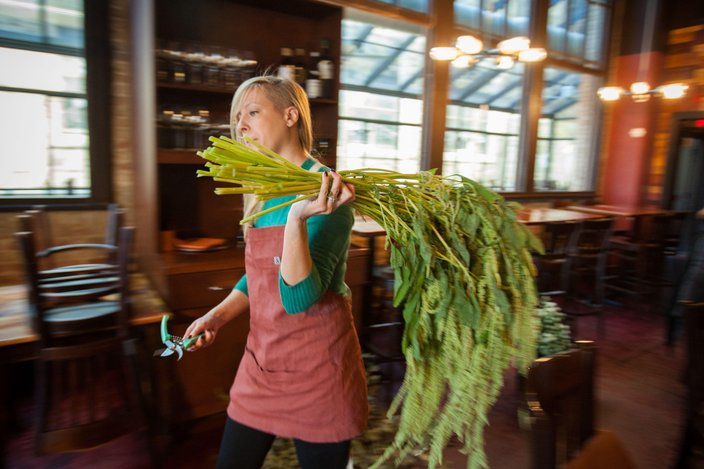
“Pulling [the flowers] yourself, you see the difference in shading,” Skene says during a recent trip to Pennock Floral shop in Pennsauken Township, New Jersey, where she selects flowers from the green and yellow bins lining the cooler.
She holds pinkish white and yellow white carnations up against each other.
“Carnations get a bad rap,” she says, referring to the cheesy ‘90s vibe they never seemed to shake.
She points out how the orange “carns” in her hand bring out the orange in the branches of a eucalyptus plant.
“I could easily just call a florist – I got 10 tables? Send me over 10 tables’ worth of flowers, you know?” Vetri COO Jeff Benjamin says.
At Vetri, the professionalism of the staff struck her. The servers were there because that’s what they wanted to do with their lives, she says. Two years passed. When McKinley asked her to take over ordering flowers for the restaurant in place of a manager who left, she said yes. She’d always wanted to be an artist, she says, but she couldn’t draw. She was “flying blind.” But beneath the chaos was the focusing simplicity of playing with colors and shapes.
“It really felt Zen and like I was expressing myself,” she says.
The wanderer was finding her way among the fields.
Back in the cooler, Skene makes her way up and down the cold corridors. She picks out blue thistle, seeded silver eucalyptus pods that resemble spray-painted acorns and Ginestra, a line of flowers climbing up branches like pussy willows. The trick is to use one unusual piece to anchor the bouquet and then build around it. She gathers up bunches of white flowers for contrast: cushion Maisy pompoms, Ranunculus, white majolica spray roses. This week’s load is lighter than usual. Her favorite color scheme is often white and one other color. She chooses red mini Gerberas for Osteria, New Jersey.
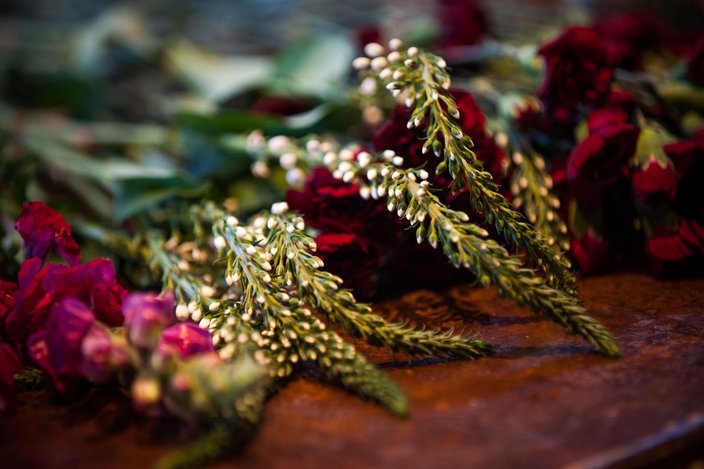
Her tinkering with arrangements caught the eye of Jeff Benjamin, chairman of operations for the Vetri Family of restaurants. He upped the ante.
“If you’re going to do it for Vetri, we’ve got a whole company for you to work with,” he told her.
At the time, there were three restaurants in the Vetri Family. There are more than twice that number now. Skene started looking into Amis and Osteria in Philadelphia.
What she found was a “disaster.” Random hostesses were ordering directly from a shop in Reading Terminal Market. There was no cohesion among them, and, as is often the case when ordering sight unseen, the quality and variety of flowers were poor.
Skene took action. She made a presentation to Benjamin detailing how she planned to overhaul the company’s flower program. Benjamin had started at Vetri as a server when he opened doors with the chef. In her first big move, Skene set up a business account at Pennock, where she could get fresher flowers.
“It seems like the universe is pointing me in this direction," Skene says.
One day, she got a call. The woman who was supposed to be doing the arrangements for the Great Chefs Event of 2013, a ticketed tasting event that brings in chefs from around the country to raise money for the Vetri Foundation’s kids’ nutrition initiative, had vanished. No one could get in contact with her, and the event was only days away. Yes, she said, she’d do it.
“I got my best friend to help me, and we stayed up all night doing them,” she says.
This year, they came to her first.
It takes a light touch to blend a distinct aesthetic with the vibe of a dining room, let alone a major culinary gathering.
“I could easily just call a florist – I got 10 tables? Send me over 10 tables’ worth of flowers, you know?” Benjamin says. “She absolutely would say, 'These flowers make the light shine better.’”
To a corporation of exquisitely branded eateries, that means everything.
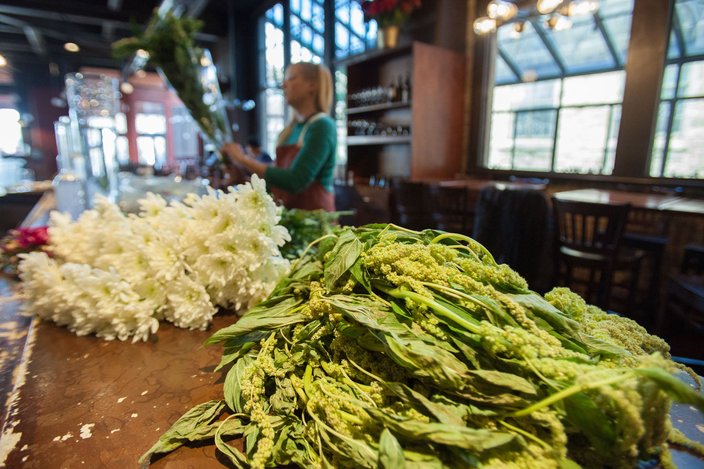
Balancing food and scent is a skill in and of itself. Sometimes, floral scents complement wine or pantry items that use lavender, for instance. Wines at Vetri, Benjamin says, often use floral descriptors to sell customers on flavor. The priority is to let the food smell on its own.
People only notice floral decorations when they’re distracting, he adds. When they aren’t, the response is generally more pleasing and invokes ambience rather than any one stylistic flourish. The more seamlessly they blend, the greater their impact. Alla Spina, the more casual kid in the litter, takes boxes of succulents rather than petals.
“I’ll get, almost nightly, ‘Man, this room feels warm and friendly.’ And I know it’s because of that,” Benjamin says.
Led by instinct up until that point, Skene decided to go back to school. The FlowerSchool New York offers an intensive series course of eight classes over a week in Chelsea. The course covers “the basics” of flower arrangements, how to shop for flowers and connections in the rather exclusive industry. It costs $2,600. Skene and Benjamin split the cost.From the executive’s point of view, it’s in the interest of the company to shell out for training that will make employees better at their jobs. Whatever makes you love what you do, will make you successful at doing it. Benjamin has sent management to accounting classes before and operations personnel as far as Italy.

As with internal promotions, which brought all of Vetri’s current top executives up from entry-level positions, employees have to work for their company’s investment in them; once they get it, they have more to offer, and they’re expected to put more back in as a result.
“We’re big fans of saying we don’t give you a promotion, you earn it,” says Benjamin. “Because you also earn it if you don’t make it and have to leave.”
But sometimes you have to leave the scene that made you to find out who you are. For Skene, Vetri had been an arena in which to grow and to experiment with taste and colors. But she was beginning to outgrow the business. By 2014, it was understood that Skene would be promoted to special events coordinator of Vetri’s private dining room. That spring, she turned down the offer.
“Doors are opening for me to do flowers,” she told Benjamin. “It seems like the universe is pointing me in this direction.”
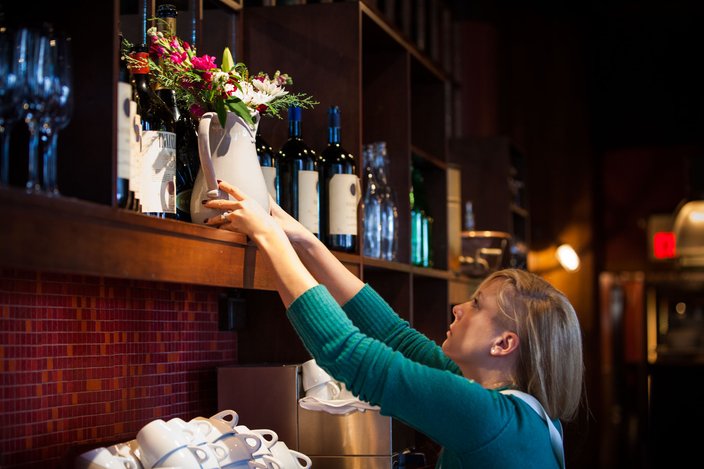
Taking the job would have meant quitting her passion, the business of cultivated beauty. The hostess proposed a higher-stakes counteroffer. She asked them to make her director of décor, a role that would oversee the flowers, planters and holiday decorations streamlined across the ever-multiplying restaurants.
The job, in fact, does not exist. One day, Benjamin says, the company will be big enough to justify creating the position. They aren’t there yet. Benjamin came back to Skene with a challenge. He could eventually give her the job, but if she were really going to run a business, she should do it right.
“I’m good at this,” Skene says. “And I’m not going to make any excuses for it, or saying that I am.”
They compromised. Skene now unofficially manages the Vetri flower program, pulling and ordering flowers for all their locations, but only arranging Vetri’s flowers by hand. The trick, always, is to stay within budget. But at Vetri, no expenses are spared.
The most expensive flowers sit in a cluster in a corner of the back room at Pennock. Their prices fluctuate with their availability, and a rose-like flower rings up at more than $10 at checkout. It’s also dying in places. Skene's “quality control,” a guy named Marty who sends the flowers she doesn’t have time to deliver herself, throws it in.
“He’s my guy,” she says as she smiles.
Taking the Vetri corporation on as a client would have meant working 35 hours a week, albeit at much higher fees; under their current arrangement, the company is saving 30 percent on flower costs, she says. It works for them, and it works for her. Does she have a title?
“Meredith,” she says, shrugging. “I have an email.”
In the meantime, Skene works with management at each locale to decorate for the seasons. Whatever arrangements she doesn’t do herself get done by the other hostesses. Christmas décor is “low-hanging fruit,” according to Benjamin, but the real test is decorating for the other 11 months of the year. It takes a subtle hand.
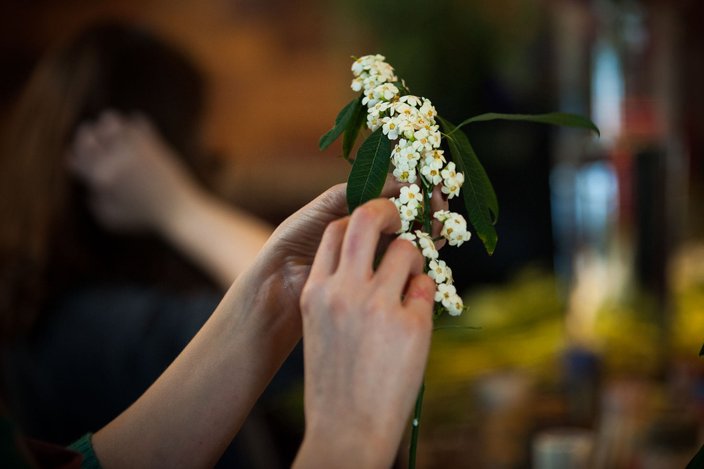
Today, business is blooming. Skene did the flowers for her own wedding. Shortly after that, she quit hostessing at Vetri. Stems by Meredith, still in its website design and business card development stage, has branched out almost entirely by word-of-mouth. Most notably, Laurel owner Nicholas Elmi, of “Top Chef” fame, joined her chef-forward client roster.
But not without a little help from her friends. When Elmi asked if anyone knew of a florist, Vetri Family Beverage Director Steve Wildy tweeted back her name. She now serves at Laurel two nights a week and does their table flowers.
“Because it’s the only flower in the room, I try to make sure it’s really cool,” she says.
The only rule: No red.
“He thinks it’s bad luck. It’s hilarious.”
When it comes to putting your money where your mouth — or taste — is, you can’t be too careful.
Skene has lots of plans for the future. She’d like to find a niche in the wedding flower circuit, work out of a studio and set up a direct line to New York for local, farm-fresh flowers. She knows her worth, enough not to shrink away from standing up for her ability, a trap that young women often fall into.
“I’m good at this,” she says. “And I’m not going to make any excuses for it, or saying that I am.”
Nor is she likely to forget where she came from.
“I basically grew up in their dining room,” she says of Vetri.
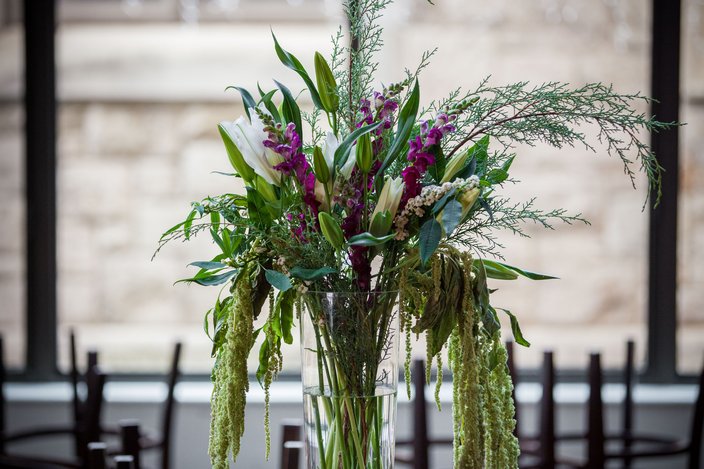
In a nod to the kitchens that helped raise her, Skene intends to stage/apprentice – work for experience, not money – at a local flower shop in the new year.
Losing talent is a drawback for any restaurant that positions itself as a launchpad for others’ success. But for Skene, staying in the “family” is still a part of the plan. Vetri will likely continue outsourcing seasonal decorations to her until that elusive interior design position becomes available. Until then, though, the door’s always open.
“You know, I want my kids to go to college one day and start a life,” says Benjamin. "But if they ever stumble, they can come back.”
Full disclosure: The author worked at Osteria in 2014.